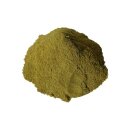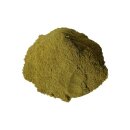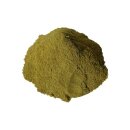Moringa Blattpulver
Moringa oleifera Blattpulver
Moringa ist ein tropischer Baum und resistent gegen Trockenheit.
Unser Moringa wird nicht mechanisch hergestellt. Alles Handarbeit!
Moringa ist eine wichtige Nahrungsquelle. Schon kleine Mengen können tausende Menschen vor dem Tode schützen.
In der alten Ayurveda seit jahrtausenden bekannt.
In Ghana findet man Moringa öfters in Saucen.
Studien zeigen, dass die Moringablätter eine hervorragende Quelle für Vitamine, Mineralstoffe und Eiweiß ist.
-Moringa wurden essentielle und nicht-essentielle Aminosäuren in hohen Mengen nachgewiesen
-Moringa ist eine sehr reiche und gesunde Vitaminquelle für sehr viele Menschen. (Vitaminreichste)
-Moringasamen reinigen schmutziges Waser
genutzt werden:
- Blätter: Nahrungsmittel (frisch oder getrocknet)
- Blüten: Gewürz, Bienenzucht, Medizin
- Früchte: Nahrungsmittel
- Samen: Nahrungsmittel, Öl, Wasserreinigung, neue Anpflanzung
- Rinde: Medizin, Seilherstellung, Papierherstellung
- Wurzeln: Nahrungsmittel, Medizin
- Ganze Pflanze: Tierfutter, Biomasse für alternative Energie
- Die „Abfallprodukte“: Bodenverbesserer und Biodünger, Tierfutter.
in english:
Moringa is a fast growing tree which can reach a maximum high of 6-14m and a diameter of 2-4m.
Malnutrition with Moringa:
Malnutrition is a significant factor also in the Sub-Sahel Zone in west-africa. In the most poorest countries as one child in five will die during a small children. Many million people die by chronic undernutrition. Here we can find several factors as: arid climate, drought, poverty, unemployment, war, refugees…
Moringa grows wild in north-Ghana. Moringa grows quickly from seeds or cutting and generate itself after severe pruning. The tree is often cultivated as a fence around the house or garden. The tree is known for its many medicinal uses. But by the traditional method of preparing the leaves they lost the nutritional values.
During our project since 2010 we trained teacher, doctor and many other people in the villages in methods of drying the leaves and used as a food additive.
The target is to produce Moringa leaf powder in large amounts for use in nutritional programs. (low cost, availability on the market, acceptance…)
Moringa parts and their uses:
Seeds (kernels, shells, oil, fuel, cooking, cosmetic, medicinal and industrial uses, animal feed, water purification)
Roots (medicinal use, human consumption)
Bark (medicinal use)
Leaves (human consumption, medicinal use, animal feed)
Stems (animal feed)
Twigs (animal feed)
The seeds:
The seed powder produced of the seeds of the Moringa tree can help to purify water of muds, bacteria and viruses. But in north-Ghana not many people use this method to obtain drinking water. Moringa seeds contain 30-45% oil. The oil is very yellow and used in the kitchen, in the cosmetic industry, in the soap industry, precision engeering and in the parfume industry. The oil has plenty of oleic acid (69-74%). Other edible oils contain only about 39-41% oleic acid. The press-cake as a byproduct of the oil extraction process comprised a very high level of protein. The dry seeds can be grounded to a powder and find use in different sauces. Also good is to eat it to salads.
Leaves:
After cutting the trees they wash and remove/strip all the leaves. Damaged leaves are discarded. After this we can bring it into the drying room. The drying room is a ventilated room. It`s important to dry the leaves in 2-3 days, depending on conditions of humidity. After drying the leaves can be pounded in a mortar in a groundnut mill or in a hammer mill to pack it into a clean cardboard with polythene bag and heat-sealed that the powder in the box is hermetically sealed. This is important for freshness and dryness. The cardboards are stored in a cool and dry place.
The Vitamin C content of Moringa leaves is very high. Fresh and very young leaves can be eaten raw.
Nutritional values ( 100gr. ) fresh Moringa leaves:
| Proteins | 5-7 grams |
| Minerals | |
| Calcium (CA) | 360-560 mg |
| Potassium (K) | 200-500 mg |
| Magnesium (Mg) | 80-120 mg |
| Phosphorus (P) | 50-120 mg |
| Iron (Fe) | 5-8 mg |
| Manganese (Mn) | 1,2-2,6 mg |
| Copper (Cu) | 0,2-0,3 mg |
| Vitamins | |
| Vitamin C | 120-220 mg |
| Vitamin A | 1500-4000 µg retinol eq. |
| Vitamin E | 150-200 mg |
100 grams of fresh Moringa leaves could cover 100% of daily need. Important is that the fresh leaves are not heated that the vitamin A destroyes.
Nutritional values ( 100gr. ) dry Moringa leaves
| Proteins | 20-28 grams |
| Minerals | |
| Calcium (Ca) | 1600-2400 mg |
| Potassium (K) | 800-1900 mg |
| Magnesium (Mg) | 350-500 mg |
| Phosphorus (P) | 200-650 mg |
| Iron (Fe) | 18-30mg |
| Manganese (Mn) | 5-10 mg |
| Zinc (Zn) | 1,5-3,5 mg |
| Copper (Cu) | 0,7-1,4 mg |
| Vitamins | |
| Vitamin C | 15-120 mg |
| Vitamin A | 4000-9000 µg retinol eq. |
| Vitamin E | 80-150 mg |
Stems and Twigs:
They have a low crude protein Content.
Artikel 1 - 3 von 3
Artikel 1 - 3 von 3



